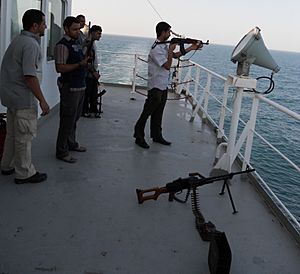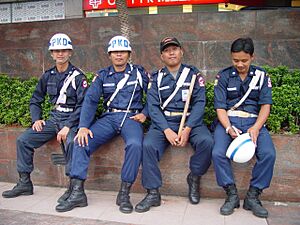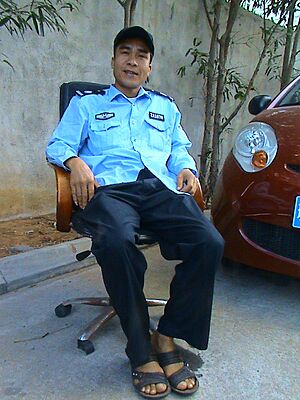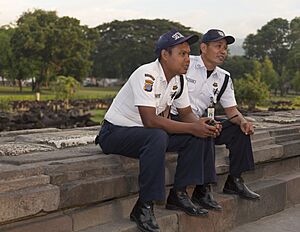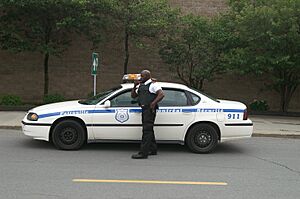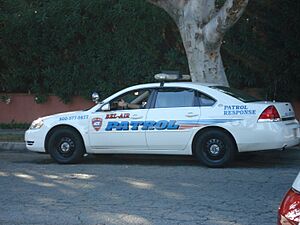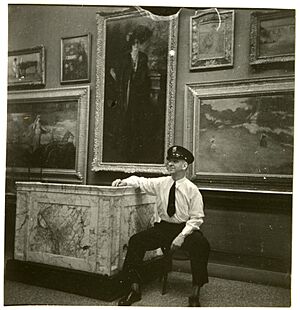Security guard facts for kids
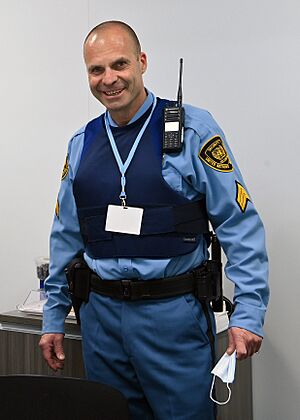
|
|
| Occupation | |
|---|---|
|
Occupation type
|
Employment |
|
Activity sectors
|
Security |
| Description | |
|
Related jobs
|
Usher, bouncer, doorman, bodyguard, hall monitor, armored car guard, loss prevention officer |
A security guard is someone hired by a government or a private company to protect their property, people, equipment, or money. They help keep things safe from dangers like crime, damage, or accidents. Security guards do this by being visible, which helps stop bad things from happening.
They also watch for signs of trouble, either by walking around (patrolling) or by watching alarm systems and video cameras. If something happens, they act to prevent more harm, like asking people who shouldn't be there to leave. They also report any problems to their clients and to emergency services like the police or paramedics.
Security officers often wear uniforms to show they have the authority to protect private property. Rules and laws usually guide what security guards can do and what training they need. Many different places hire security officers, including businesses, government offices, and non-profit groups like churches. The term "watchman" was used more often in the past, but now "security guard" or "security officer" is more common.
Contents
What Do Security Guards Do?
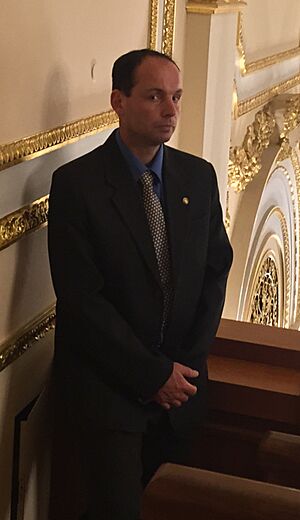
Many security companies follow a simple plan: "detect, deter, observe, and report." This means they look for problems, try to stop them, watch what happens, and then write a report. Security officers are not usually required to make arrests, but they can sometimes make a citizen's arrest if needed. They can also help law enforcement if asked by a police officer.
A main job of a security officer is to protect their client from various dangers, especially criminal acts. Security staff make sure company rules are followed and work to protect lives and property. They are often trained for special tasks like using emergency equipment, giving first aid or CPR, taking notes, and writing detailed reports.
Some security officers get extra training to carry special equipment like batons, firearms, or pepper spray. This training is often required by law. In recent years, with more concerns about terrorism, many security officers learn about bomb threats and emergency situations. This is especially true for those working in public places like shopping malls or schools.
Having security guards can also help businesses save money on insurance. For example, if a fire starts, a security guard can notice it quickly and call the fire department, preventing a total loss. Security guards also help reduce theft, employee misconduct, and damage to property. Many casinos use security officers to protect large amounts of money when it's moved.
Controlling Who Enters and Exits
Security personnel often control who can enter and leave buildings or parking areas. They make sure employees and visitors show the right passes or identification before coming in. Security officers also respond to smaller problems like broken lights or doors, minor injuries, or lost people.
In serious emergencies like medical issues, fires, or crimes, they help by keeping the area safe. They call emergency responders, guide people to safe spots, and write reports about what happened. These reports help clients understand how to prevent similar problems in the future. Armed security officers might act like law enforcement until the police arrive.
Patrolling and Monitoring
Patrolling is a big part of a security officer's job. Many problems are stopped just by a guard being present and looking for issues. These patrols are often recorded using a guard tour patrol system. In the past, this meant using mechanical clocks, but now electronic systems are more common. These systems are light, easy to use, and can record when and where a guard has been.
Regular patrols used to be common, but now random patrols are preferred. This makes it harder for criminals to predict where a guard will be. Global positioning systems (GPS) are also used to track officers' movements and behavior more effectively.
Who Works in Security?
Security officers are different from police officers or military personnel. However, in places like Australia and the United States, many security staff have past experience in the police or military. On the other hand, some young people use security jobs to gain experience before applying to law enforcement agencies.
Different Types of Security Roles
Security personnel can work in different ways:
- In-house: They work directly for the company they protect, like a mall, theme park, or casino.
- Contract: They work for a private security company that protects many different places.
- Public Security: These are security officers hired by a government or government agency.
- Private Police Officers or Special Police: These officers have some police-like powers, usually for specific areas.
- Private Patrol Officers: These officers drive around and protect several client properties.
Some common names for security jobs include: security guard, security officer, security agent, safety patrol, and public safety officer. Specialized jobs include Usher, bouncer, bodyguards, loss prevention officers, and armored car guards.
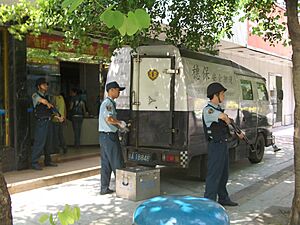
There's a difference between guards who just "observe and report" and those who take a more active role in protecting people and property. The latter are often called "Security Officers" or "Protection Officers" and usually have more training. They are more likely to interact with the public and confront criminals.
Security officers are private citizens. This means they must follow the same laws as everyone else. They are not allowed to pretend to be police officers.
Training for Security Guards
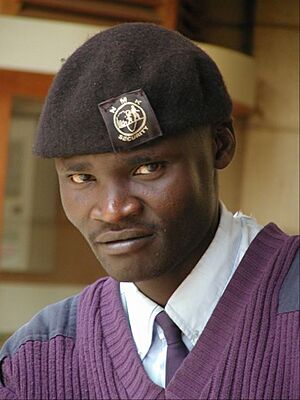
Australia
In Australia, anyone working in security needs a license. Each state and territory has its own laws for security activities. These laws make sure that security workers are properly trained and have a good background. For example, they must complete professional training courses.
Rules also cover what uniforms and badges security companies can use. They cannot use uniforms or titles that might make people confuse them with police officers. For instance, "Security Police" is not allowed. Security officers may carry firearms, handcuffs, or batons if their job requires it and if they have the right license and training.
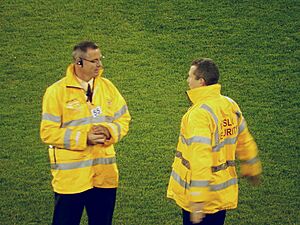
Canada
In Canada, rules for private security are set by each province and territory. Most of them require security companies and their employees to be licensed. Many provinces also have rules about security officers using handcuffs or weapons like firearms and batons. Some ban them completely, while others allow them only in certain situations.
Canada's federal laws also limit security officers from carrying weapons. For example, it's generally against the law for anyone, including a security officer, to have handguns outside their home, unless they have special permission for their job, like armored car guards.
British Columbia
In British Columbia, security is regulated by the Security Services Act. Guards must be at least 19 years old, pass a background check, and complete a training course. The law strictly limits security officers from carrying weapons or restraints like handcuffs, unless the government allows it. However, armored car officers are allowed to carry firearms.
United Kingdom
In the UK, most contract security officers need a special license from the Security Industry Authority (SIA). This license must be shown when they are on duty. It is valid for three years and requires formal training and a criminal record check.
Some "in-house" security guards, who work directly for the company they protect (like a supermarket), might not need an SIA license. However, if they work as door supervisors at a licensed place, they do need one. Armed guarding is illegal in the UK because most citizens are not allowed to carry firearms or offensive weapons like batons or pepper spray. However, guards may carry handcuffs in rare cases, and some wear stab-resistant vests.
United States
In the United States, there are more private security officers than police officers. Most states require a license to work as a security officer. This often includes a criminal background check and required training. Security guards have the same power to make a "citizen's arrest" as any private citizen. If they carry weapons, they usually need extra permits and training.
Armed security personnel often protect sensitive places like government buildings, banks, and nuclear power plants. However, armed security is becoming more common for vehicle patrols and other non-government sites. The jobs of security guards in the U.S. are growing, with private security often helping with services that police departments used to provide.
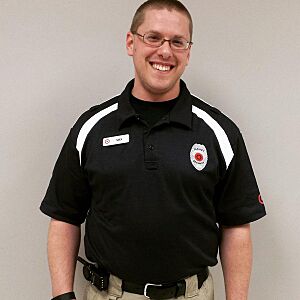
California – Security Guards need a license from the Bureau of Security and Investigative Services (BSIS). They must be at least 18, pass a criminal background check, and complete 40 hours of training. This training covers topics like the power to arrest and general security procedures. They also need 8 hours of annual training.
Illinois – Security Guards need a Permanent Employee Registration Card (PERC Card). Unarmed guards must be at least 18, and armed guards must be 21. Armed guards also need a Firearm Owner's Identification Card (FOID Card).
New Jersey – Since 2006, most security personnel working for security companies must complete a state-certified training program called SORA.
New Mexico – Since 2008, all security guards must pass FBI background checks and a certified training program. Armed guards need extra firearm training and a psychological exam.
New Orleans, Louisiana – In New Orleans, some armed security officers are given limited police powers as "New Orleans Police Special Officers." They can make arrests for serious crimes on the property they protect and can pat down arrested people for weapons.
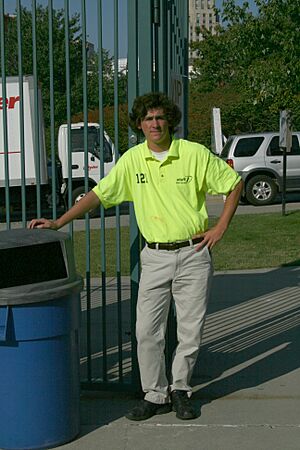
North Carolina – Security Officers must register and be certified with the Private Protective Services Board (PPSB). Unarmed officers need 16 hours of training, while armed officers need more classroom training and must qualify with their firearm.
Oklahoma – Security officers are licensed by CLEET. Unarmed officers need 40 hours of training and background checks. Armed guards need another 40 hours of training, firearm qualification, and a psychological evaluation.
Oregon – Security officers must be licensed by the Department of Public Safety, Standards and Training. They need classroom instruction, and armed officers also need a basic marksmanship course.
Pennsylvania – Unarmed security guards don't need a license. However, anyone carrying a firearm must be a "Certified Agent" and complete a 40-hour training course, including shooting practice.
South Carolina – All Security Officers have similar authority to Sheriff's Deputies while on the property they protect. They can respond to calls, make arrests, and sometimes issue traffic tickets if authorized.
St. Louis, Missouri – Security officers need a license from the St. Louis County Police Department or St. Louis Police Department. Training is a two-day class, with yearly renewals. Armed officers must practice shooting twice a year.
Texas – Texas has three types of Security Officer licenses, each with different training levels. All training is regulated by the Department of Public Safety's Private Security Bureau.
- Level II/Non-Commissioned Officer: Requires 6 hours of training.
- Level III/Commissioned Officer: Requires a 40-hour course, including defense tactics, handcuffing, and firearms training.
- Level IV/Personal Protection Officer: Requires an additional 15 hours of training for bodyguards, plus a psychological test.
Virginia – Security Officers need to be certified by DCJS (Department of Criminal Justice Services). Unarmed officers need 18 hours of training. Armed officers need an additional 24 hours of firearms training and 8 hours on lawful arrest. They can arrest for crimes committed in their presence on the property they protect. Some officers can become "Conservators of the Peace" with more training, giving them police-like powers on their work property.
Security Guards vs. Police Officers
Security personnel are generally not police officers, unless they are security police who work for the government. Security officers get their powers from state laws and agreements with their clients. This means they can ask questions and protect private property. Police officers, on the other hand, protect entire communities by enforcing laws and arresting suspected criminals.
Sometimes, security officers are given limited extra powers, especially when they protect public property like train stations. This is a special situation that varies by location. Also, security officers might be asked to help law enforcement if a police officer needs immediate backup. Some security officers who work directly for government agencies might have reserve police powers. Local governments sometimes hire security agencies to patrol public areas, and these personnel are sometimes called "private police officers."
See also
- Access control
- Airport security
- Armored car (valuables)
- Bodyguard
- Bounty hunter
- Car guard
- Certified Protection Officer
- Commissionaire
- Counterterrorism
- Executive protection
- Hotel detective
- Infrastructure security
- List of private security companies
- Loss prevention
- Northern Ireland Security Guard Service
- Nuclear security
- Paramilitary
- Physical security
- Police officer
- Port security
- Private investigator
- Private military company
- Private security company
- Security
- Security police
- Store detective
- Traffic guard
- Transportation security officer
- Use of force continuum
 | Bessie Coleman |
 | Spann Watson |
 | Jill E. Brown |
 | Sherman W. White |


